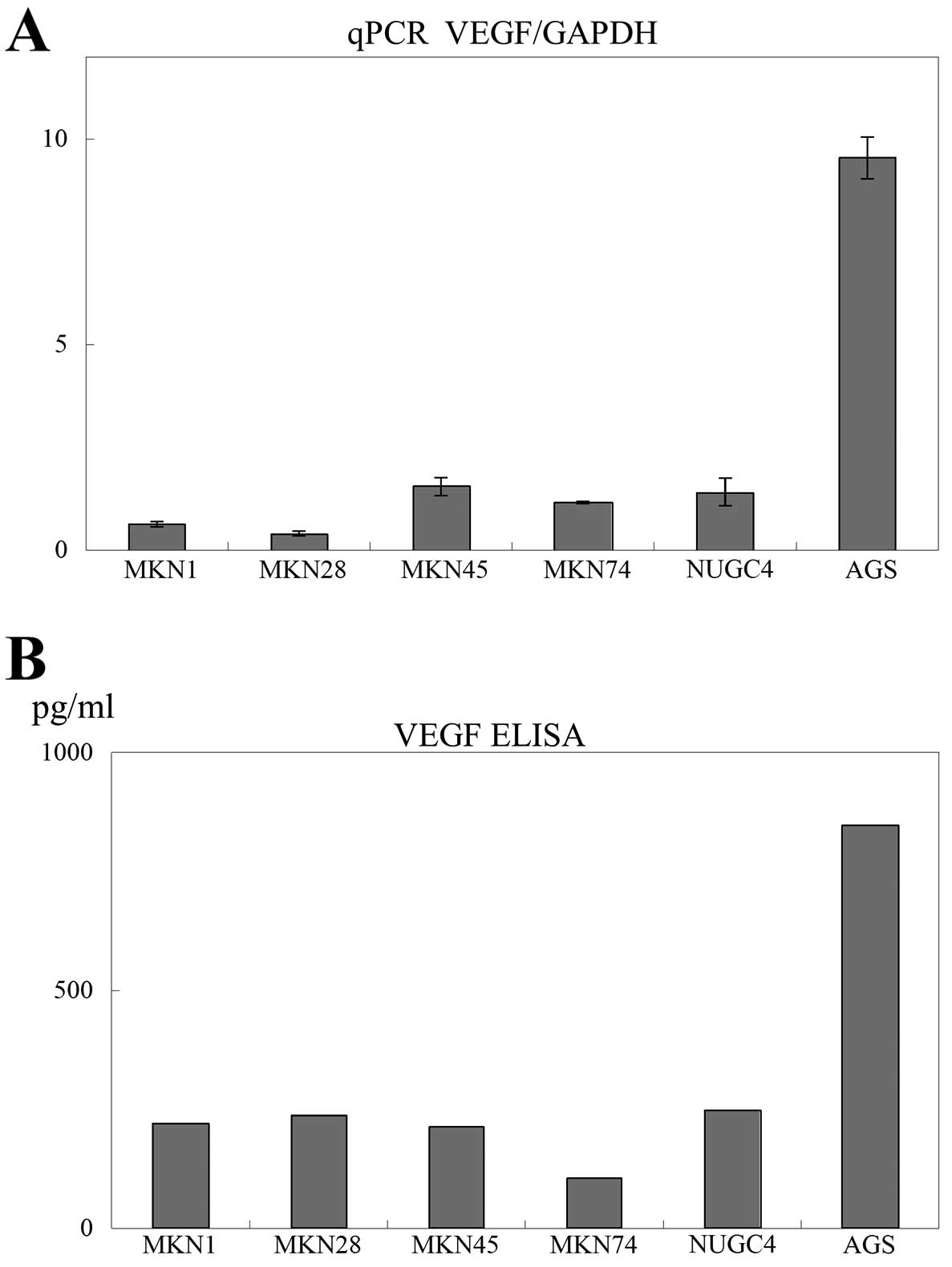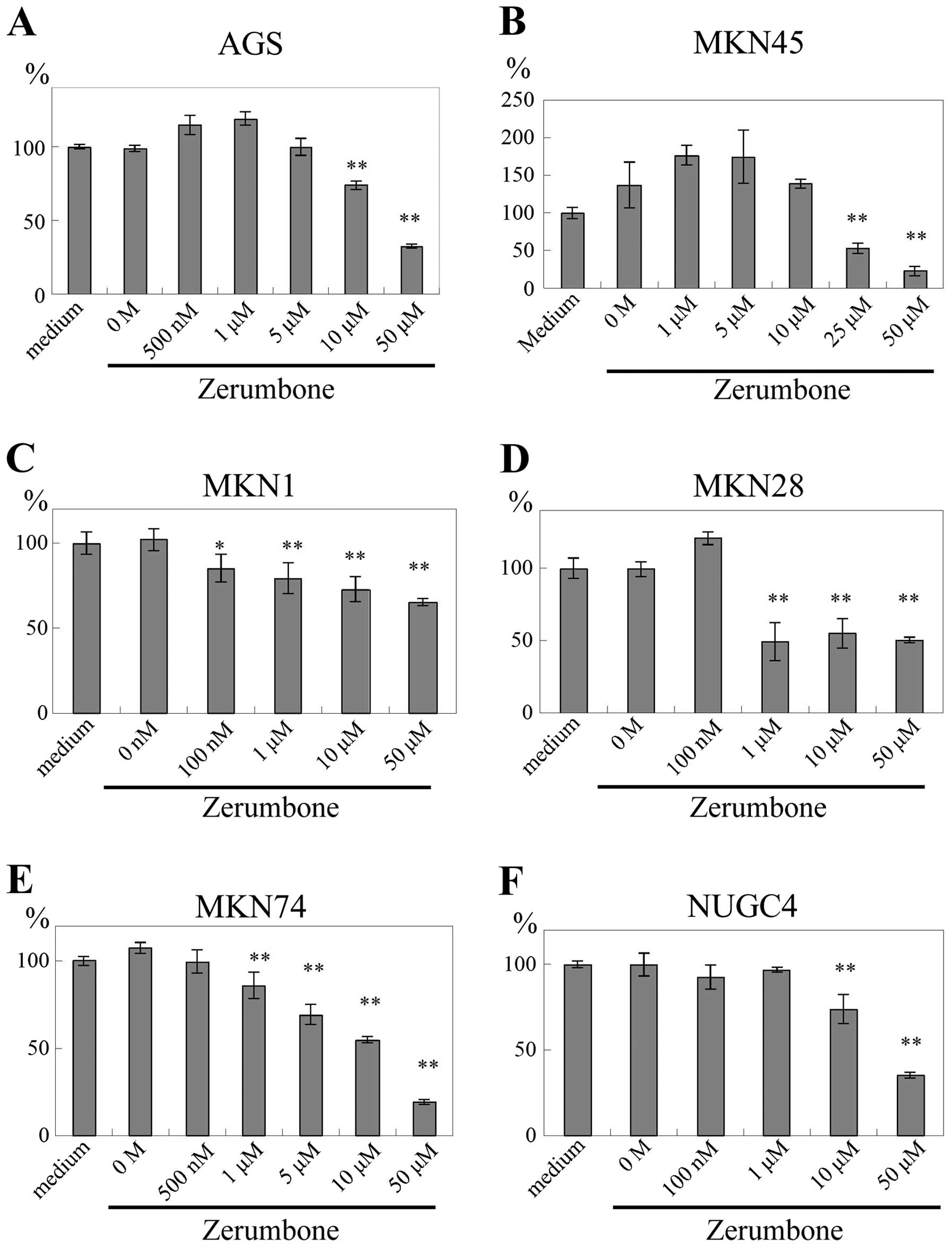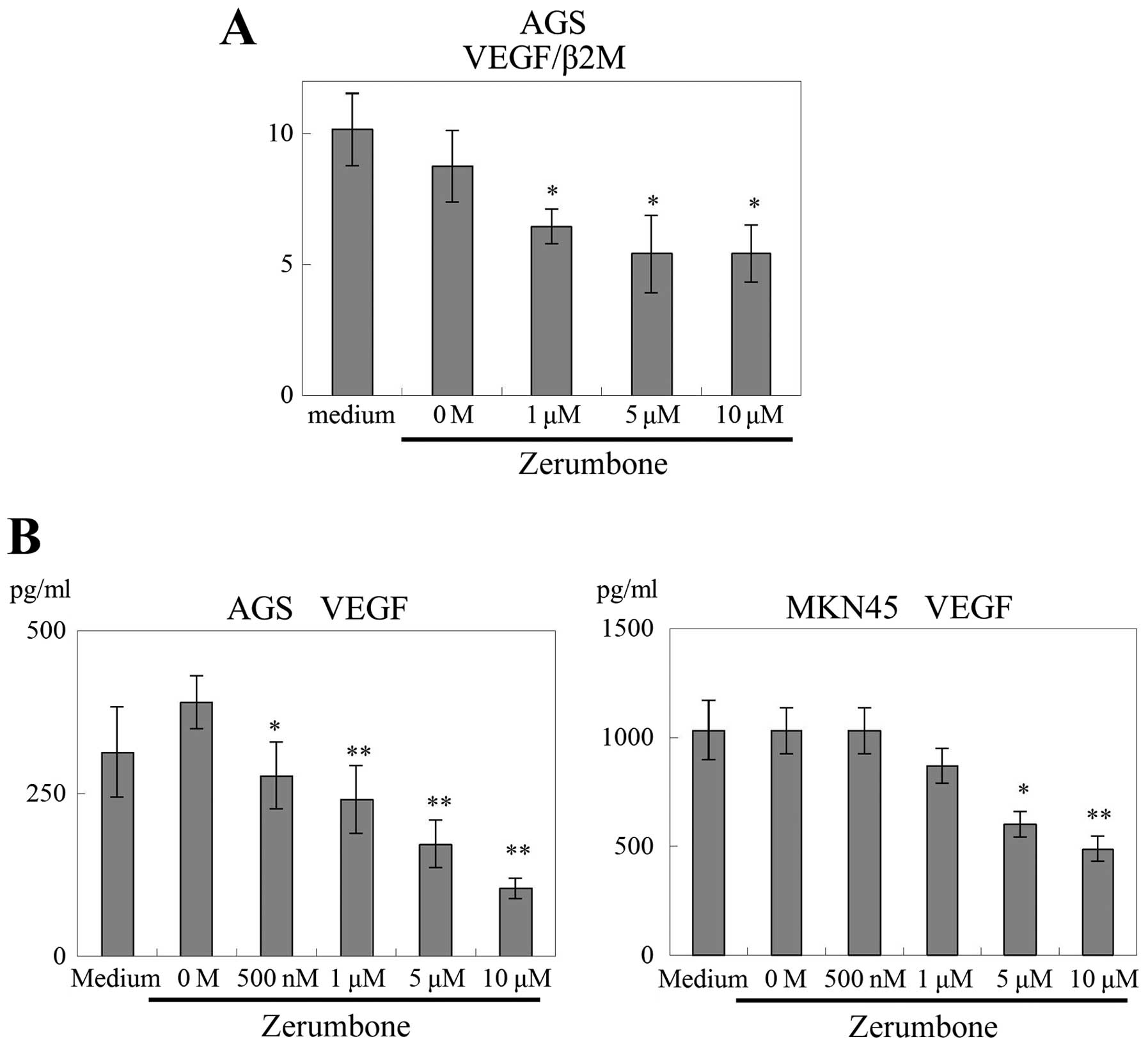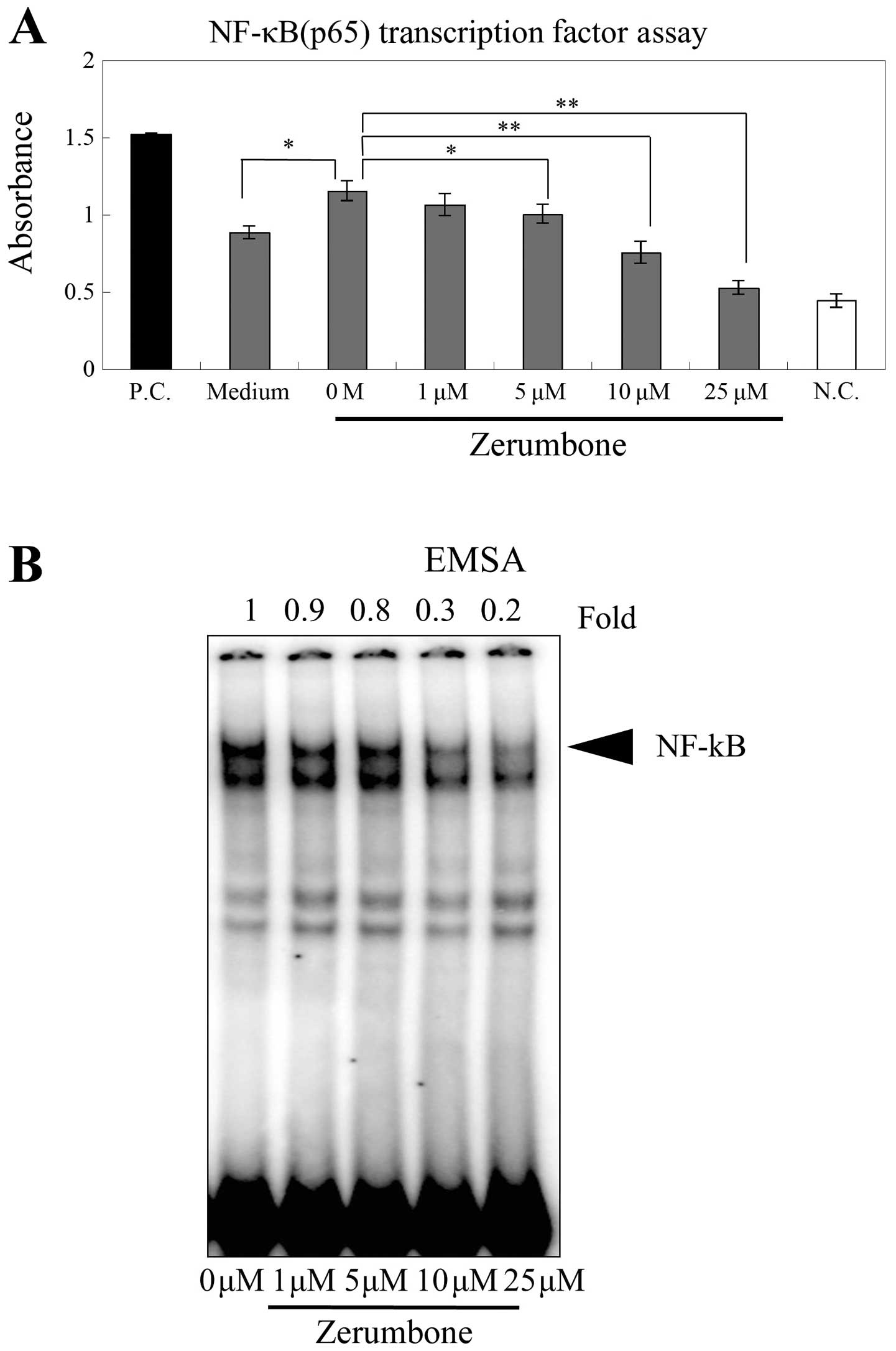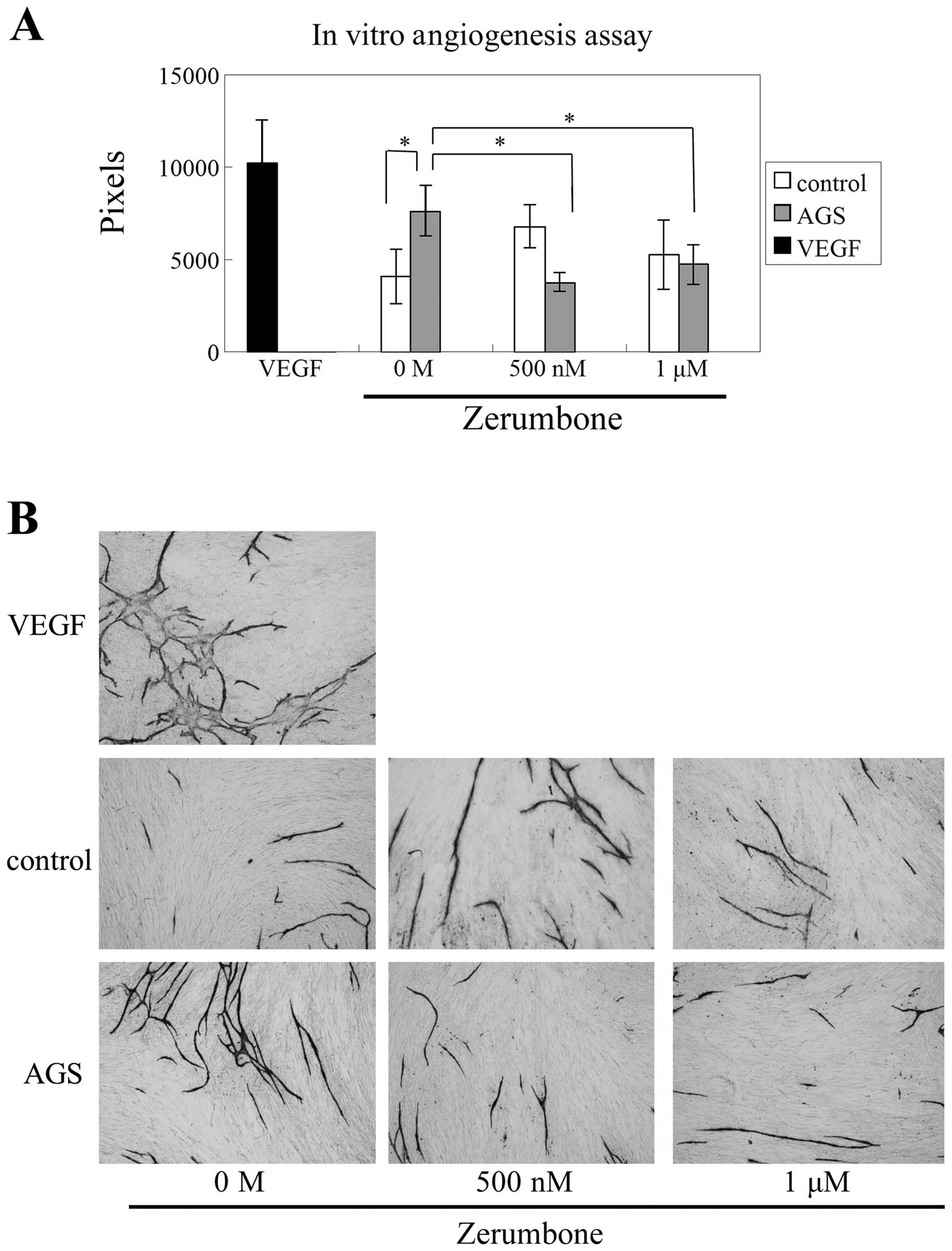|
1
|
Ferlay J, Shin HR, Bray F, Forman D,
Mathers C and Parkin DM: Estimates of worldwide burden of cancer in
2008: GLOBOCAN 2008. Int J Cancer. 13:2893–2917. 2010. View Article : Google Scholar : PubMed/NCBI
|
|
2
|
Jemal A, Bray F, Center MM, Ferlay J, Ward
E and Forman D: Global cancer statistics. CA Cancer J Clin.
13:69–90. 2011. View Article : Google Scholar
|
|
3
|
Hartgrink HH, Jansen EP, van Grieken NC
and van de Velde CJ: Gastric cancer. Lancet. 13:477–490. 2009.
View Article : Google Scholar
|
|
4
|
Wagner AD, Grothe W, Haerting J, Kleber G,
Grothey A and Fleig WE: Chemotherapy in advanced gastric cancer: a
systematic review and meta-analysis based on aggregate data. J Clin
Oncol. 24:2903–2909. 2006. View Article : Google Scholar : PubMed/NCBI
|
|
5
|
Matsuo Y, Sawai H, Funahashi H, et al:
Enhanced angiogenesis due to inflammatory cytokines from pancreatic
cancer cell lines and relation to metastatic potential. Pancreas.
28:344–352. 2004. View Article : Google Scholar : PubMed/NCBI
|
|
6
|
Tong Z, Kunnumakkara AB, Wang H, et al:
Neutrophil gelatinase-associated lipocalin: a novel suppressor of
invasion and angiogenesis in pancreatic cancer. Cancer Res.
68:6100–6108. 2008. View Article : Google Scholar : PubMed/NCBI
|
|
7
|
Matsuo Y, Sawai H, Ochi N, et al:
Interleukin-1alpha secreted by pancreatic cancer cells promotes
angiogenesis and its therapeutic implications. J Surg Res.
153:274–281. 2009. View Article : Google Scholar : PubMed/NCBI
|
|
8
|
Matsuo Y, Ochi N, Sawai H, et al:
CXCL8/IL-8 and CXCL12/SDF-1alpha co-operatively promote
invasiveness and angiogenesis in pancreatic cancer. Int J Cancer.
124:853–861. 2009. View Article : Google Scholar : PubMed/NCBI
|
|
9
|
Matsuo Y, Sawai H, Ma J, et al: IL-1alpha
secreted by colon cancer cells enhances angiogenesis: the
relationship between IL-1alpha release and tumor cells’ potential
for liver metastasis. J Surg Oncol. 99:361–367. 2009.PubMed/NCBI
|
|
10
|
Matsuo Y, Sawai H, Ochi N, et al:
Proteasome inhibitor MG132 inhibits angiogenesis in pancreatic
cancer by blocking NF-kappaB activity. Dig Dis Sci. 55:1167–1176.
2010. View Article : Google Scholar : PubMed/NCBI
|
|
11
|
Matsuo Y, Raimondo M, Woodward TA, et al:
CXC-chemokine/CXCR2 biological axis promotes angiogenesis in vitro
and in vivo in pancreatic cancer. Int J Cancer. 125:1027–1037.
2009. View Article : Google Scholar : PubMed/NCBI
|
|
12
|
Matsuo Y, Campbell PM, Brekken RA, et al:
K-Ras promotes angiogenesis mediated by immortalized human
pancreatic epithelial cells through mitogen-activated protein
kinase signaling pathways. Mol Cancer Res. 7:799–808. 2009.
View Article : Google Scholar
|
|
13
|
Carmeliet P: Angiogenesis in health and
disease. Nat Med. 9:653–660. 2003. View Article : Google Scholar : PubMed/NCBI
|
|
14
|
Ma J, Sawai H, Matsuo Y, et al:
Interleukin-1alpha enhances angiogenesis and is associated with
liver metastatic potential in human gastric cancer cell lines. J
Surg Res. 148:197–204. 2008. View Article : Google Scholar : PubMed/NCBI
|
|
15
|
Maeda K, Chung YS, Ogawa Y, et al:
Prognostic value of vascular endothelial growth factor expression
in gastric carcinoma. Cancer. 77:858–863. 1996. View Article : Google Scholar : PubMed/NCBI
|
|
16
|
Maeda K, Kang SM, Onoda N, et al: Vascular
endothelial growth factor expression in preoperative biopsy
specimens correlates with disease recurrence in patients with early
gastric carcinoma. Cancer. 86:566–571. 1999. View Article : Google Scholar
|
|
17
|
Kikuchi S, Obata Y, Yagyu K, et al:
Reduced serum vascular endothelial growth factor receptor-2
(sVEGFR-2) and sVEGFR-1 levels in gastric cancer patients. Cancer
Sci. 102:866–869. 2011. View Article : Google Scholar : PubMed/NCBI
|
|
18
|
Karayiannakis AJ, Syrigos KN,
Polychronidis A, et al: Circulating VEGF levels in the serum of
gastric cancer patients: correlation with pathological variables,
patient survival, and tumor surgery. Ann Surg. 236:37–42. 2002.
View Article : Google Scholar : PubMed/NCBI
|
|
19
|
Kim KK and Kim HB: Protein interaction
network related to Helicobacter pylori infection response.
World J Gastroenterol. 15:4518–4528. 2009. View Article : Google Scholar : PubMed/NCBI
|
|
20
|
Varro A, Noble PJ, Pritchard DM, et al:
Helicobacter pylori induces plasminogen activator inhibitor
2 in gastric epithelial cells through nuclear factor-kappaB and
RhoA: implications for invasion and apoptosis. Cancer Res.
64:1695–1702. 2004. View Article : Google Scholar
|
|
21
|
Keates S, Hitti YS, Upton M and Kelly CP:
Helicobacter pylori infection activates NF-kappa B in
gastric epithelial cells. Gastroenterology. 113:1099–1109. 1997.
View Article : Google Scholar
|
|
22
|
Xiong HQ, Abbruzzese JL, Lin E, Wang L,
Zheng L and Xie K: NF-kappaB activity blockade impairs the
angiogenic potential of human pancreatic cancer cells. Int J
Cancer. 108:181–188. 2004. View Article : Google Scholar : PubMed/NCBI
|
|
23
|
Beg AA and Baldwin AS Jr: The I kappa B
proteins: multifunctional regulators of Rel/NF-kappa B
transcription factors. Genes Dev. 7:2064–2070. 1993. View Article : Google Scholar : PubMed/NCBI
|
|
24
|
Verma IM, Stevenson JK, Schwarz EM, Van
Antwerp D and Miyamoto S: Rel/NF-kappa B/I kappa B family: intimate
tales of association and dissociation. Genes Dev. 9:2723–2735.
1995. View Article : Google Scholar : PubMed/NCBI
|
|
25
|
Nam SY, Ko YS, Jung J, et al: A
hypoxia-dependent upregulation of hypoxia-inducible factor-1 by
nuclear factor-κB promotes gastric tumour growth and angiogenesis.
Br J Cancer. 104:166–174. 2011.
|
|
26
|
Nakata W, Hayakawa Y, Nakagawa H, et al:
Anti-tumor activity of the proteasome inhibitor bortezomib in
gastric cancer. Int J Oncol. 39:1529–1536. 2011.PubMed/NCBI
|
|
27
|
Caballero-Velázquez T, López-Corral L,
Encinas C, et al: Phase II clinical trial for the evaluation of
bortezomib within the reduced intensity conditioning regimen (RIC)
and post-allogeneic transplantation for high-risk myeloma patients.
Br J Haematol. 162:474–482. 2013.
|
|
28
|
Gupta SC, Kim JH, Prasad S, et al:
Regulation of survival, proliferation, invasion, angiogenesis, and
metastasis of tumor cells through modulation of inflammatory
pathways by nutraceuticals. Cancer Metastasis Rev. 29:405–434.
2010. View Article : Google Scholar : PubMed/NCBI
|
|
29
|
Yob NJ, Jofrry SM, Affandi MM, et al:
Zingiber zerumbet (L.) Smith: a review of its
ethnomedicinal, chemical, and pharmacological uses. Evid Based
Complement Alternat Med. 2011:5432162011.PubMed/NCBI
|
|
30
|
Murakami A, Takahashi D, Kinoshita T, et
al: Zerumbone, a Southeast Asian ginger sesquiterpene, markedly
suppresses free radical generation, proinflammatory protein
production, and cancer cell proliferation accompanied by apoptosis:
the alpha, beta-unsaturated carbonyl group is a prerequisite.
Carcinogenesis. 23:795–802. 2002. View Article : Google Scholar
|
|
31
|
Sung B, Jhurani S, Ahn KS, et al:
Zerumbone down-regulates chemokine receptor CXCR4 expression
leading to inhibition of CXCL12-induced invasion of breast and
pancreatic tumor cells. Cancer Res. 68:8938–8944. 2008. View Article : Google Scholar : PubMed/NCBI
|
|
32
|
Yodkeeree S, Sung B, Limtrakul P and
Aggarwal BB: Zerumbone enhances TRAIL-induced apoptosis through the
induction of death receptors in human colon cancer cells: evidence
for an essential role of reactive oxygen species. Cancer Res.
69:6581–6589. 2009. View Article : Google Scholar
|
|
33
|
Kirana C, McIntosh GH, Record IR and Jones
GP: Antitumor activity of extract of Zingiber aromaticum and
its bioactive sesquiterpenoid zerumbone. Nutr Cancer. 45:218–225.
2003.
|
|
34
|
Kim M, Miyamoto S, Yasui Y, Oyama T,
Murakami A and Tanaka T: Zerumbone, a tropical ginger
sesquiterpene, inhibits colon and lung carcinogenesis in mice. Int
J Cancer. 124:264–271. 2009. View Article : Google Scholar : PubMed/NCBI
|
|
35
|
Xian M, Ito K, Nakazato T, et al:
Zerumbone, a bioactive sesquiterpene, induces G2/M cell cycle
arrest and apoptosis in leukemia cells via a Fas- and
mitochondria-mediated pathway. Cancer Sci. 98:118–126. 2007.
View Article : Google Scholar : PubMed/NCBI
|
|
36
|
Huang GC, Chien TY, Chen LG and Wang CC:
Antitumor effects of zerumbone from Zingiber zerumbet in
P-388D1 cells in vitro and in vivo. Planta Med. 71:219–224. 2005.
View Article : Google Scholar : PubMed/NCBI
|
|
37
|
Sakinah SA, Handayani ST and Hawariah LP:
Zerumbone induced apoptosis in liver cancer cells via modulation of
Bax/Bcl-2 ratio. Cancer Cell Int. 7:42007. View Article : Google Scholar : PubMed/NCBI
|
|
38
|
Sung B, Murakami A, Oyajobi BO and
Aggarwal BB: Zerumbone abolishes RANKL-induced NF-κB activation,
inhibits osteoclastogenesis, and suppresses human breast
cancer-induced bone loss in athymic nude mice. Cancer Res.
69:1477–1484. 2009.PubMed/NCBI
|
|
39
|
Takada Y, Murakami A and Aggarwal BB:
Zerumbone abolishes NF-κB and IκBα kinase activation leading to
suppression of antiapoptotic and metastatic gene expression,
upregulation of apoptosis, and downregulation of invasion.
Oncogene. 24:6957–6969. 2005.
|
|
40
|
Chen D, Frezza M, Schmitt S, Kanwar J and
Dou QP: Bortezomib as the first proteasome inhibitor anticancer
drug: current status and future perspectives. Curr Cancer Drug
Targets. 11:239–253. 2011. View Article : Google Scholar : PubMed/NCBI
|
|
41
|
Aggarwal BB, Van Kuiken ME, Iyer LH,
Harikumar KB and Sung B: Molecular targets of nutraceuticals
derived from dietary spices: potential role in suppression of
inflammation and tumorigenesis. Exp Biol Med. 234:825–849. 2009.
View Article : Google Scholar : PubMed/NCBI
|
|
42
|
Li-Weber M: New therapeutic aspects of
flavones: the anticancer properties of Scutellaria and its
main active constituents Wogonin, Baicalein and Baicalin. Cancer
Treat Rev. 35:57–68. 2009. View Article : Google Scholar : PubMed/NCBI
|
|
43
|
Harikumar KB, Sung B, Tharakan ST, et al:
Sesamin manifests chemopreventive effects through the suppression
of NF-kappa B-regulated cell survival, proliferation, invasion, and
angiogenic gene products. Mol Cancer Res. 8:751–761. 2010.
View Article : Google Scholar
|
|
44
|
Bhuiyan NI, Chowdhury JU and Begum J:
Chemical investigation of the leaf and rhizome essential oils of
Zingiber zerumbet (L.) Smith from Bangladesh. Bangladesh J
Pharmacol. 4:9–12. 2009.
|
|
45
|
Zakaria ZA, Mohamad AS, Chear CT, Wong YY,
Israf zDA and Sulaiman MR: Antiinflammatory and antinociceptive
activities of Zingiber zerumbet methanol extract in
experimental model systems. Med Princ Pract. 19:287–294.
2010.PubMed/NCBI
|
|
46
|
Zakaria ZA, Mohamad AS, Ahmad MS, et al:
Preliminary analysis of the anti-inflammatory activity of essential
oil of Zingiber zerumbet. Biol Res Nurs. 13:425–432. 2011.
View Article : Google Scholar : PubMed/NCBI
|
|
47
|
Tushar, Basak S, Sarma GC and Rangan L:
Ethnomedical uses of Zingiberaceous plants of Northeast India. J
Ethnopharmacol. 132:286–296. 2010. View Article : Google Scholar : PubMed/NCBI
|
|
48
|
Somchit MN and Shukriyah MHN:
Antiinflammatory property of ethanol and water extracts of
Zingiber zerumbet. Indian J Pharmacol. 35:181–182. 2003.
|
|
49
|
Somchit MN, Shukriyah MHN, Bustamam AA and
Zuraini A: Anti-pyretic and analgesic activity of Zingiber
zerumbet. Int J Pharmacol. 1:277–280. 2005. View Article : Google Scholar
|
|
50
|
Sulaiman MR, Tengku Mohamad TA, Shaik
Mossadeq WM, et al: Antinociceptive activity of the essential oil
of Zingiber zerumbet. Planta Med. 76:107–112. 2010.
View Article : Google Scholar : PubMed/NCBI
|
|
51
|
Jantan IB, Yassin MS, Chin CB, Chen LL and
Sim NL: Antifungal activity of the essential oils of nine
Zingiberaceae species. Pharm Biol. 41:392–397. 2003. View Article : Google Scholar
|
|
52
|
Voravuthikunchai SP, Phongpaichit S and
Subhadhirasakul S: Evaluation of antibacterial activities of
medicinal plants widely used among AIDS patients in Thailand. Pharm
Biol. 43:701–706. 2005. View Article : Google Scholar
|
|
53
|
Voravuthikunchai SP, Limsuwan S, Supapol O
and Subhadhirasakul S: Antibacterial activity of extracts from
family Zingiberaceae against foodborne pathogens. J Food Safety.
26:325–334. 2005. View Article : Google Scholar
|
|
54
|
Phongpaichit S, Vuddhakul V,
Subhadhirasakul S and Wattanapiromsakul C: Evaluation of the
antimycobacterial activity of extracts from plants used as
self-medication by AIDS patients in Thailand. Pharm Biol. 44:71–75.
2006. View Article : Google Scholar
|
|
55
|
Tewtrakul S and Subhadhirasakul S:
Anti-allergic activity of some selected plants in the Zingiberaceae
family. J Ethnopharmacol. 109:535–538. 2007. View Article : Google Scholar : PubMed/NCBI
|
|
56
|
Murakami A and Ohigashi H: Targeting NOX,
INOS and COX-2 in inflammatory cells: chemoprevention using food
phytochemicals. Int J Cancer. 121:2357–2363. 2007. View Article : Google Scholar : PubMed/NCBI
|
|
57
|
Murakami A, Shigemori T and Ohigashi H:
Zingiberaceous and citrus constituents, 10-acetoxychavicol acetate,
zerumbone, auraptene, and nobiletin, suppress
lipopolysaccharide-induced cyclooxygenase-2 expression in RAW264.7
murine macrophages through different modes of action. J Nutr.
135(Suppl 12): 2987–2992. 2005.
|
|
58
|
Maeda S, Yoshida H, Ogura K, et al: H.
pylori activates NF-kappaB through a signaling pathway
involving IkappaB kinases, NF-kappaB-inducing kinase, TRAF2, and
TRAF6 in gastric cancer cells. Gastroenterology. 119:97–108. 2000.
View Article : Google Scholar
|
|
59
|
Lamb A and Chen LF: Role of the
Helicobacter pylori-induced inflammatory response in the
development of gastric cancer. J Cell Biochem. 114:491–497.
2013.
|
|
60
|
Yin Y, Si X, Gao Y, Gao L and Wang J: The
nuclear factor-κB correlates with increased expression of
interleukin-6 and promotes progression of gastric carcinoma. Oncol
Rep. 29:34–38. 2013.
|















